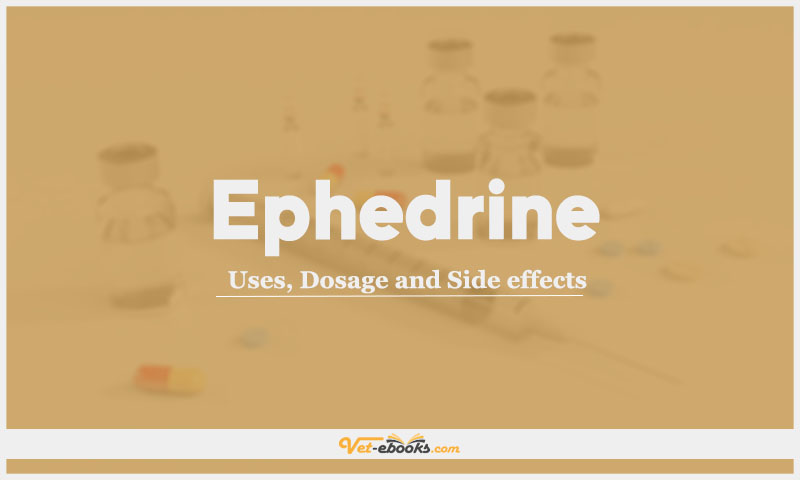Ephedrine: Uses, Dosage and Side Effects

Overview
- Non-catecholamine sympathomimetic directly activates alpha- and beta-adrenergic receptors and indirectly releases noradrenaline.
- also causes bladder relaxation and internal urethral sphincter contraction.
- Compared with more powerful sympathomimetics, e.g. oxymetazoline and xylometazoline, there is less of a rebound effect.
Uses of Ephedrine
- Treatment of hypotension during anaesthesia.
- Also used orally in the treatment of urinary incontinence.
- Proposed for treatment of nasal congestion.
- Use with caution in dogs and cats with cardiovascular disease, partial urethral obstruction, hypertension, diabetes mellitus, hyperadrenocorticism, hyperthyroidism or other metabolic disorders.
Dose of Ephedrine in Dogs and Cats
Dogs:
- Hypotension: 0.05–0.2 mg/kg i.v.; repeat as necessary; duration of effect is short (5–15 min). Effects tend to wane after 2–3 doses have been administered.
- Urinary incontinence: 1 mg/kg p.o. q12h. The dose should be adjusted according to effect but there is a maximum dose of 2.5 mg/kg p.o. q12h.
- Nasal congestion: No dose determined. Suggest starting at 1 drop of 0.5% solution intranasally q12h. If given orally, suggest 0.5 mg/kg p.o. q12h.
Cats:
- Hypotension: 0.05–0.1 mg/kg i.v.; repeat as necessary; duration of effect is short (5–15 min). Effects tend to wane after 2–3 doses have been administered.
- Nasal congestion: 1 drop of 0.5% solution intranasally q12h. Oral formulations are not convenient for administration to most cats.
Drug Dosage Calculator
You Should Give:
Side Effects of Ephedrine in Dogs and Cats
- (panting, mydriasis, CNS stimulation) and cardiovascular effects (tachycardia, atrial fibrillation, vasoconstriction) are possible.
- Also has the potential to reduce the motility and tone of the intestinal mucosa.
Contraindications of Ephedrine in Dogs and Cats
- Do not use it in pregnant or lactating patients or those with glaucoma.
Some Notes:
- Synergistic with other sympathomimetic.
- Volatile anaesthetics will enhance the sensitivity of the myocardium to the effects of ephedrine.
- Concomitant use with cardiac glycosides (digoxin) and tricyclic antidepressants (amitriptyline) can cause arrhythmias.
- Will enhance the effects of theophylline and may cause hypertension when given with MAO inhibitors (e.g. selegeline).
Tip
Do You Want To Increase Your Veterinary Knowledge and Practical Skills?
You Can Now Browse and Download +3000 Books For Veterinary Professionals & Students Online.
Download Veterinary Books




















